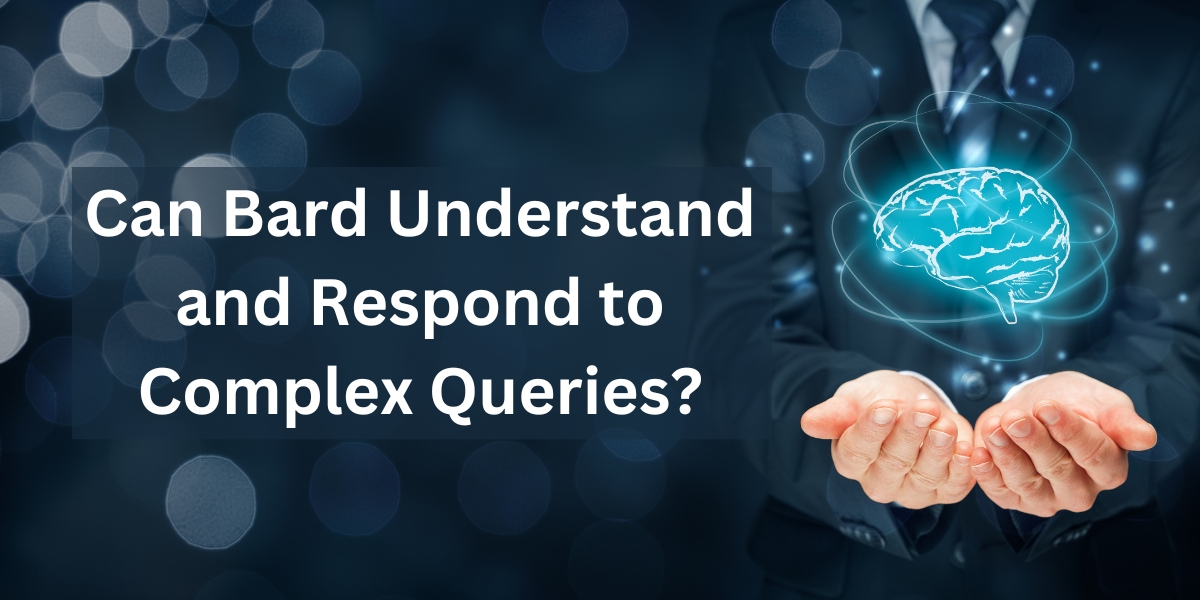Introduction
Bard is a large language model (LLM) chatbot developed by Google AI. Based on a massive dataset of text and code, it can generate text, translate languages, create creative content, and answer your questions. Can Bard Understand and Respond to Complex Queries? One of the most important capabilities of Bard is its ability to understand and respond to complex queries.
Bard can understand the meaning of a question, whether it’s open-ended, challenging, or strange. Bard can also generate a comprehensive and informative response, even if the question pertains to a topic it hasn’t been explicitly trained on.
In this article, we will explore Bard’s ability to understand and respond to complex queries.
We will also address some of the limitations of Bard and explore how it can enhance SEO.
Can Bard Understand Complex Queries?
Yes, Bard can understand complex queries. It does this by using a variety of techniques, including:
- Natural language processing (NLP): NLP is the study of how computers interact with language. NLP techniques allow Bard to understand the meaning of words and phrases, as well as the relationships between them.
- Machine learning: This type of artificial intelligence allows computers to learn without being explicitly programmed. Bard uses machine learning to improve its understanding of language over time.
- Training data: Bard is trained on a massive dataset of text and code. This data allows Bard to learn about the world and how to answer questions about it.
As a result of these techniques, Bard can understand a wide variety of complex queries. For example, Bard can answer questions about:
- Science and technology: “What is the theory of relativity?”
- History: “What was the cause of the American Civil War?”
- Literature: “What is the meaning of Hamlet’s soliloquy?”
- What is the latest news on the war in Ukraine?”
- Personal finance: “How can I save money on my mortgage?”
How Does Bard Respond to Complex Queries?
When asked a complex query, Bard first attempts to understand the meaning of the question. It does this by breaking the question into smaller parts and analyzing the relationships among those parts. Once Bard understands the meaning of the question, it generates a response.
The response that Bard generates is typically a paragraph or two long. The writer has written it clearly and concisely, tailoring it to the specific question that was asked.
Bard also tries to be as informative as possible, and it will often provide links to additional resources that the user can consult.
Limitations of Bard
While Bard is very good at understanding and responding to complex queries, it is not perfect. Some of the limitations of Bard include:
- It can sometimes make mistakes. This is because Bard is still under development, and it is not always able to understand the meaning of a question perfectly.
- It can be biased. This is because Bard is trained on a dataset of text that is created by humans, and this dataset may contain biases.
- It can be slow. Bard can take some time to generate a response to a complex query.
How Can Bard Be Used to Improve SEO?

Bard can be used to improve SEO in a number of ways. For example, Bard can be used to:
- You can use Bard to create relevant content for your keywords.
- You can use this content to boost your search engine rankings and attract more visitors to your website.
- Bard can answer questions related to your website.
- By doing so, you will improve the user experience and encourage visitors to stay longer.
- In Bard, you can create backlinks to your website. Backlinks are links from other websites to your site.
Conclusion
In conclusion, Bard is a powerful LLM chatbot capable of understanding and responding to complex queries. By creating high-quality content, answering user questions, and creating backlinks.
To answer the question, yes, Bard can understand and respond to complex queries. It does this by using various techniques, such as natural language processing, machine learning, and training data. Bard is still under development, but it is constantly learning and improving. As it becomes more sophisticated, it will be able to understand and respond to even more complex queries.
If you are looking for a way to improve your SEO, Bard is a valuable tool. By using it, you can create high-quality content, answer user questions, and create backlinks. By using Bard, you can improve your search engine visibility and attract more visitors to your website.
FAQs
Yes, Bard can write code. It is possible to generate code in a variety of languages, including Python, Java, and C++.
Yes, Google Bard is a large language model. It uses a massive dataset of text and code to generate text, translate languages, write creative material, and answer questions.
Yes, Bard is an AI chatbot. It can have conversations with humans, answer their questions, and generate different creative text formats.
A virtual assistant like Google Assistant can help you with tasks like setting alarms, playing music, and getting directions. Bard is a large language model that generates text, translates languages, writes creative content, and answers your questions.
Bert and Bard are both large language models, but they have different strengths and weaknesses. Bert is better at understanding the meaning of text, while Bard is better at generating text.

